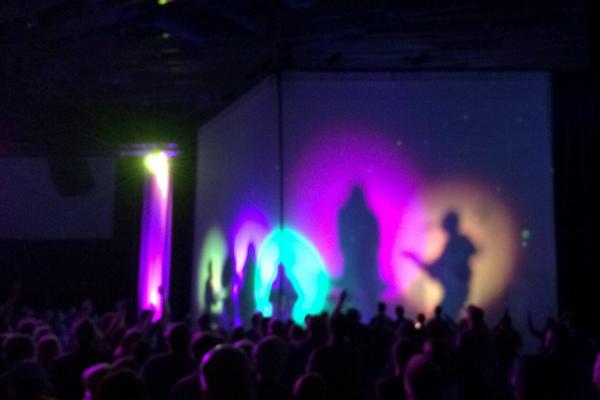IT’S A WEDNESDAY night in early November and the sanctuary of Redemption Church in Olathe, Kan., is full. The audience, mostly 20- and 30-somethings, is listening in rapt attention to Mike McHargue, better known as Science Mike. Self-proclaimed science enthusiast McHargue, co-host (with musician and songwriter Michael Gungor) of The Liturgists Podcast, is doing a live episode of his solo side podcast, Ask Science Mike, as part of a tour for his new book, Finding God in the Waves.
After questions ranging from the neurological effect of belief on the brain to the role of women in the church, a young man stands and shares his story. He works at a conservative church, he says, and finds his beliefs are starting to differ from the people he works with. Finally, he asks, “When you start to ask big questions, and you don’t know where they’re going, and you don’t know where they’ll take you, how do you find the courage to continue to move forward when you know it might have dramatic consequences?”
“I have terrible news,” McHargue answers. “If this continues, you will not fit in where you are. How do I know? There are a thousand people at a Baptist church, who I love dearly, who could not stand to be in a room with me, because I’m the one who rebelled against the tribe.” He pauses a moment before continuing. “Here’s the other thing. This is good. The way you understood God, that served you for so long, isn’t working anymore because you’re growing. ... So I say, get excited.”
McHargue and his Liturgists Podcast co-host Gungor are no strangers to questions about belief, doubt, and straying from the theological tribe. Both men grew up in conservative evangelical churches, and both men lost their faith as adults, regaining it in a different form later on. It’s an experience familiar to plenty of the millennials and Gen-Xers who make up the “nones,” the growing portion of the U.S. population who have no religious affiliation.
Appealing to the nones
In a 2016 Pew survey on nones, 78 percent of respondents said they were raised in a particular religion but lost their faith as adults. The top reason for leaving: no longer believing in the faith they were raised with. One in five people surveyed cited a dislike of organized religion. Others cited the divisive nature of religion and the church’s teachings on homosexuality as reasons they left.
For Liturgists listeners who fit into these categories, McHargue and Gungor’s experiences with doubt and faith, as well as the open, welcoming theological perspective they embrace via their podcast, have a major appeal. It’s an appeal that has so far yielded 250,000 subscribers and sold out live events, and led to the publication of Finding God in the Waves, McHargue’s account of his struggles with doubt and experience regaining his faith.
Adam Brewster, a Liturgists listener from Iowa, said the podcast speaks directly to parts of his own faith journey. “It’s continually given language to experiences I’ve had and that I know others have had, and as a result has made it possible to talk easily about some complex topics related to faith,” he told Sojourners. “I don’t know if I would’ve had all those tools at my disposal without the Liturgists podcast.”
The show, which has taken on topics such as the church and the LGBTQ community, race in America, and multiverse theory, often takes a questioning, learning approach to the topic at hand. McHargue and Gungor have frequently allowed their podcast to be a platform for others to speak instead of an outlet to preach a specific set of beliefs. For example, in their recent episode, “Woman,” the hosts gave control of the show over to women to speak about their experiences with sexism in society, home, and the church.
They also, McHargue notes, take listener feedback and constructive criticism very seriously.
“People I’ve talked to who are involved in church work [have] a very odd relationship to critique, where they’ll tend to push back or hide,” McHargue told Sojourners. “[Michael and I] tend to go ‘yeah, bring it on,’ and then we actually change how we do things just by paying attention to what the people who listen have to say. It makes it much more of a community.”
Beginnings
Their collaboration began when McHargue and Gungor met at a party. Both men connected over their mutual doubt and disillusionment with the church.
“We realized that a lot of people today find themselves in an odd situation, in that they find the church too dogmatic, too obsessed with the culture war, but [find]skepticism to be too dismissive of the human desire for mystery and connection and, frankly, a longing for something we would probably call God,” McHargue said.
The pair started creating a series of liturgies, recorded as albums, which combined Gungor’s music and McHargue’s passion for science. The podcast was initially envisioned as a side project to accompany the liturgies, in which the pair could discuss issues of faith, science, and social justice in-depth. But the podcast’s success overtook their liturgical efforts and became the main focus.
“It’s funny how that became the center of our work. But, it really struck a chord,” Gungor told Sojourners. “I think there’s just so many people that feel similarly caged in by the polarizing factions of the world, and want to be able to ask questions, have conversations, seek truth in a way that doesn’t have to be so tribal, doesn’t have to be so fearful, that’s not threatened. We’re just having the conversation because that’s why we’re there, to have conversations that are open and honest.”
Listeners like Cassandra Showalter of Seattle agree. Showalter, who said she grew up among several Christian denominations, told Sojourners that for a long time she felt she had to keep her progressive political leanings a secret from friends and family to avoid judgment. “I felt like [I was] the only Christian that felt or believed the way I do,” Showalter said. “I became the first person in my family to vote for a Democrat. I remember feeling like I had to hide the fact that I voted for Obama in 2008 because I thought so many of my friends from college and high school would think I had turned my back on my faith.”
Gungor said he’s heard similar stories from his interactions with listeners. “We’ve heard parents of someone who’s gay, or white people who had no idea that racism was still a thing in America,” he said. “Story after story after story of ‘I thought that I was crazy,’ ‘I thought that I was alone,’ and then [they] start hearing other people talk about it.”
“People are hungry for it”
In addition to the polarizing atmosphere of some churches, McHargue said he attributes the rise of nones to a generational abandonment of public institutions.
“Our classic civic American institutions are all in great distress because we’re entering this very post-institutional, almost anti-institutional generational bent,” he said. “That actually has a lot of advantages, because people have a looser attachment to institutional civic identity. There’s a reason millennials are more justice-minded, more racially aware, more tuned in to the struggle of marginalized groups, because they (millennials) don’t hide behind an institution that says these people don’t belong.”
But that same anti-institutional mindset, McHargue said, has created a lonely generation in need of community. While both McHargue and Gungor have their issues with churches, McHargue is quick to defend the church as a whole.
“I’m hopelessly in love with the church,” McHargue said. “I think churches, and especially pastors, have an incredible gift to offer society that’s missing in our post-church culture. It’s a uniquely powerful social institution, and anthropology and sociology back that up.”
Gungor said he’s feeling a culturewide desire to challenge institutions even from within, in part caused by efforts like The Liturgists Podcast to make previously taboo issues easier to talk about.
“It’s funny to see and hear stories of people in more conservative evangelical churches who are listening and having conversations about some of these issues that we’ve been talking about, who never would have had that conversation two years ago,” he said. “There’s something happening in culture, in society, that’s a longing to sort of shake up that status quo. ... You still feel this surge, something in the air that all of us are feeling, that the way it’s been isn’t working.”
Based on his experiences, McHargue said that millennials of all stripes, whether they’re nones, atheists, or believers, are simply hungering for a community where they can be their authentic selves, free of judgment or adherence to a specific set of beliefs. If more churches offer that space, he said, churches may notice a change.
“I think the church needs to foster a more communal, accepting, affirming culture,” he said. “If they do that, and detach the culture-war thing, people will come back. I say that with some authority. People are flying across oceans to come to our events, because that’s the posture we employ, and people are hungry for it.”

Got something to say about what you're reading? We value your feedback!

